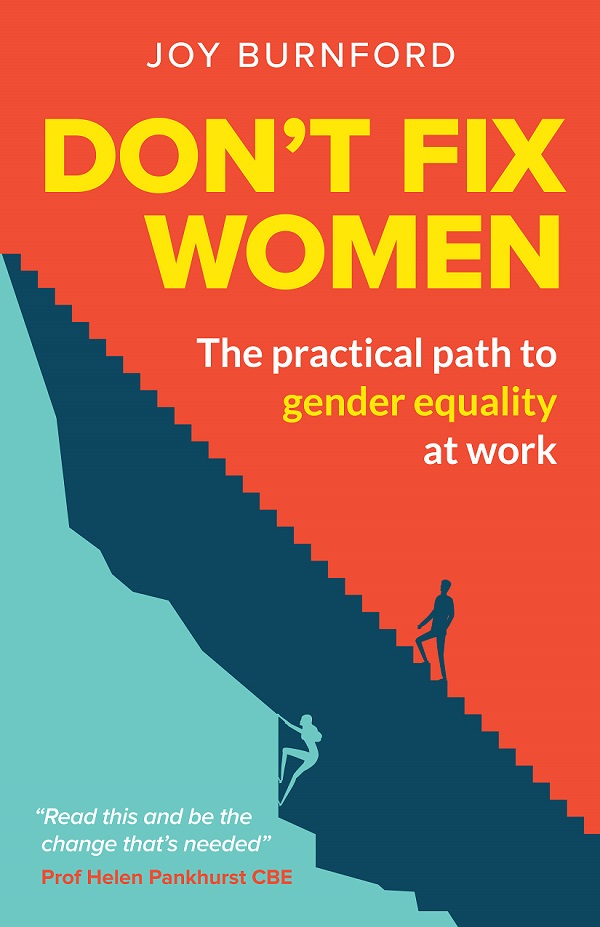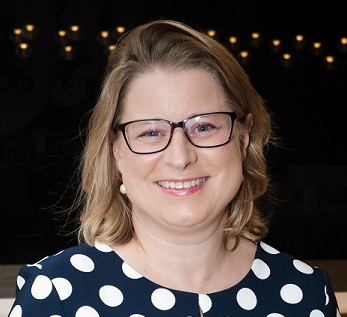Joy Burnford is author of the bestselling book Don’t Fix Women: The practical path to gender equality at work and founder and CEO of Encompass Equality. She tells Future that true gender parity is not only the moral thing to do, it offers genuine competitive advantage to businesses
When it’s suggested to Joy Burnford that she is something of a blazer of trails for her tireless support of equality and diversity in employment, her first response is to laugh. “I love being called a trailblazer. It’s amazing,” she chuckles. But the sad truth is the trail still has a long way to go before women receive equality in the workplace, globally. “We’re still 151 years away from gender parity, according to the World Economic Forum,” she says quoting the WEF’s 2022 Gender Gap Report estimate. “Although it was 268 years in the previous year, so we are making strides. But [equality won’t be achieved] in mine or my children’s lifetime. It’s still a long way off. It’s still very much a man’s world.”
The reason for that slow rate of change is that the world of business was “designed by men, for men,” says Burnford. “This isn’t anybody’s fault. We were just not set up to cater for some of the differences with more women in the workplace.” In the UK for example, only seven women are CEOs of FTSE 100 companies, she cites. So, there’s still a massive way to go to get to parity. And yet there’s so much data about the competitive advantage for those businesses that get it right. It’s not only the moral thing to do. It’s good financially for organizations, because you get diversity of thought.”
And the business advantages are clear. According to McKinsey, true gender equality everywhere would raise global GDP by up to a staggering $28 trillion “if women participate in the economy identically to men, and three times higher profit margins in companies with a quarter of women on their executive committees,” says Burnford.
So, is the message finally cutting through? “I do see progress,” says Burnford. “There are still some people who say, ‘Haven’t we done diversity yet? We’ve kind of ticked that box.’ No, we haven’t. But many organizations are trying to do more about it. The FTSE Women Leaders Review tracks the number of women on boards and in leadership positions in the UK. They started that review in 2011, when there was 12% of women on boards, and there’s been a sea-change in the gender balance of British boards on the FTSE 350 since: it’s now at 40%. They achieved that target three years early [ahead of the December 2025 target end date.]”
“There are still some people who say, ‘Haven’t we done diversity yet? We’ve kind of ticked that box.’ No, we haven’t”
Joy Burnford
Conquering the mountain
An even bigger challenge though says Burnford is addressing “the level below” executive boards. “My work is around the pipeline of women getting into those senior positions. What I see happening is that there’s a clear mountain. You get women and men joining their careers in equal numbers. Then you get halfway up the mountain, when the obstacles start piling on. For women, there’s a perfect storm of challenges and they drop off the mountain. The key is about retention. What can organizations do to retain women and make sure they’re creating a workplace that’s suitable for everybody.”
There are advances being made to conquer the challenging ascent towards gender parity though, says Burnford. “There are some things that are fantastic for gender equality, such as job sharing. For women coming back to work after maternity leave, rather than doing a part-time job, they can work for, say, three days a week, leaving two days off to focus on their kids. Some organizations are saying, ‘That’s all very well and good, but it won’t work for us.’ Yet, we know it works for medical consultants, dealing with life and death situations. Sometimes, we just need to throw the rulebook up.”
A situation such as the Covid-19 pandemic demonstrated, says Burnford, that flexibility in working at home was perfectly possible. “It took the pandemic to mandate it to make those things happen. Why wait for another pandemic: let’s just be open to change and redesign jobs. Most companies I speak to now have hybrid-working as a norm. There seems to be a massive swell of people saying, ’We want to work in a different way now’. That’s a massive shift.”
The pandemic also brought with it more empathetic leadership and greater insight into our colleagues’ health and well-being, says Burnford. “Companies who are really doing well in this area have leaders who are empathetic and understand people.”
“There’s a clear mountain. You get women and men joining their careers in equal numbers. Then you get halfway up the mountain, when the obstacles start piling on. For women, there’s a perfect storm of challenges and they drop off the mountain. The key is about retention”
Joy Burnford
Embracing the four Ms
Burnford categorizes three types of challenges women continue to face in the workplace. Firstly, hormonal challenges, which she calls the four M’s of ‘monthlies’ (or menstruation) ‘miscarriage’, ‘maternity’, and ‘menopause’. Next is – typically – having to bear the primary responsibility of childcare and elder care for ageing parents, while not neglecting self-care. The third is simply the challenge of ‘confidence’, a loss of which can often come as a result of some of the other factors. “It could be that you’ve got menopausal symptoms, and you’re having brain fog, and you then lose your confidence because you can’t speak up in a meeting, for example. Some women don’t have any of these obstacles, and often men can be affected by some of these things, but it’s generally women that take the lion’s share of that.”
To continue the mountaineering metaphor, Denise Wilson, chief executive of the FTSE Women Leaders Review, who wrote the foreword to Burnford’s book, talks about women walking up the mountain with a rucksack on their back. Women have to walk up the mountain alongside their male colleagues, but the rucksack on their back has the rocks of these responsibilities in it. For Burnford, it’s “about how you can then take away some of these rocks while they’re going up that mountain.”
Factors that can help in this instance include the three cultural frameworks of flexibility, ally-ship, and coaching and support. “These things will really help with removing some of these rocks without having to set specific initiatives up to deal with that,” says Burnford. “Take menopause, for example: if you have flexible working, somebody can work at home if they’ve had a bad night’s sleep without making a big deal of it. If somebody’s had a miscarriage, they may not want to talk about it, but to know support is there, or that they can take a special leave [of absence] is a big thing. An organization needs to have a coaching culture: great at asking questions and great at listening. If you have those two fundamental things, then you’re way down the line in terms of understanding people individual needs.

Confident of change
Having started her career in PA Consulting Group Management Consulting before working for the trade body Management Consultancies Association, Burnford co-founded Source Global Research in 2007 before starting Encompass Equality, initially called My Confidence Matters, in 2017. She was compelled to help women find more confidence to speak up at work, she says. She wrote 70+ articles for Forbes on the topic, interviewing “some amazing women” in the process, but she quickly realized that, while many women could be exceptionally confident, if an organization was not set up to embrace and support this, those women would “still end up leaving, because you need the system to be right. You need to get rid of those biases.”
Burnford duly renamed her company to Encompass Equality, realizing the work she was doing was about much more than just confidence: it was helping organizations with practical solutions to advancing gender equality and focusing specifically on retention of women. “We run coaching and leadership development programs, ally-ship workshops, and one-to-one and group coaching.
So, is she positive for a future where worldwide gender equality is no longer so extraordinarily out of step? “I really hope so. I’ve got two children. I hope their future has no barriers. By making small changes, we can create little ripples that will then make some big waves happen. But here are some massive societal things at play here that need to change. In the West, we are making progress, but there are places around the world that are just so far away from making the change happen. But we’ve got to start somewhere. And the younger generation are much more open to this.”
With that generation, and the extraordinary work of Burnford and her team, those trails will continue to be blazed, for the better of all.
Further details:
For more information visit encompassequality.com.

Joy Burnford is founder and CEO of Encompass Equality






